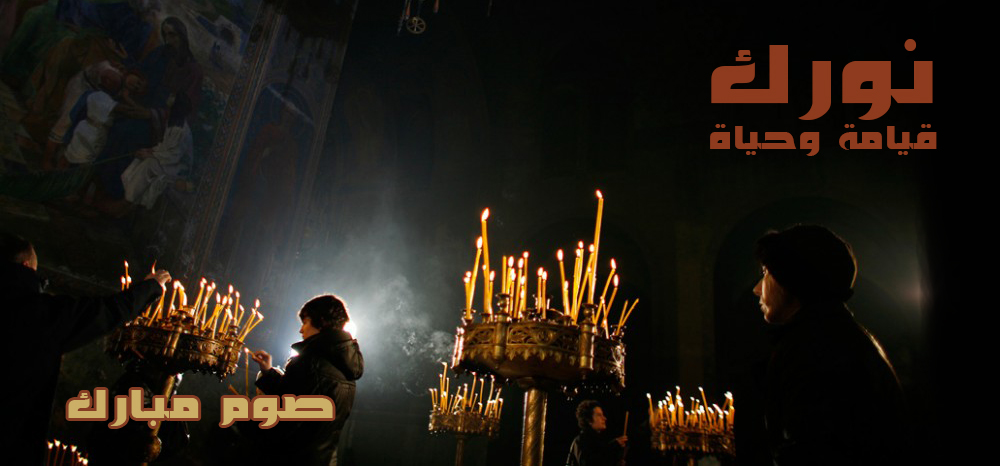
Lent, a Journey of the Kingdom
Lent, a Journey of the Kingdom
In the last week of the preparation period, after Meatfare Sunday, liturgical prayers rise to tell us about fasting: "Receiving the Feast of Fasting is full of joy and the beginning of Lent on this day is bright. Let us go forth, brothers, with great confidence and activity..."(Matins of Monday).
The prayers are related to feeding the hungry, staying away from animosity, from adultery, and telling lies.
![]()
It also shows that fasting has the power to overcome Satan's traps if they are well mastered. On the other hand, the prayers place before the faithful the model of the holy Fathers as examples to follow in their journey towards Resurrection.
* Fasting, then, is a condition in which the believer enters to take off the clothes of passions and desires and to walk in the path of prayers, love, repentance, and forgiveness. There is nothing fragmented, but a complete and integrated unit.
* Father Lev Gillet says: Fasting is a time of spiritual education and enlightenment. It is a return to God and divine bliss. Did Adam not lose the Paradise of God's bliss because of the darkness resulting from pride and disobedience? Should he not first return to God with humility and commitment to the will of God? The exit from Paradise was not eternal because the door to return is always open.
Hence, it is a clear delusion to base our fasting solely on a vegetarian and non-dairy diet, while ego and being blind towards others defect our souls and our behavior.
“In Christianity, we speak not only of spiritual life but of life as a whole, where the body and the spirit coalesce.”
Our fasting journey is a pilgrimage of the Kingdom, opposite to the exit of the first human being. And when the Church mentions “eating” in the doxastikon hymn on Saturday eve: “Adam through eating was cast out of Paradise ...” she clarifies directly the true meaning of this sentence and says through Adam: “Woe to me, what happened to me, the wretched. I disobeyed one command of my Lord an
Here is the bottom line, commitment to God’s project is a complete commitment to all of his commandments, and not choosing what suits us best and violating them whenever we want.d I lost all good things.
We are called to establish a complete communion with God, a real communion, and every violation is adultery, that is, breaking the communion.
The project of fasting, accompanied by prayer, to focus on God the Creator, avoiding gluttony, empty and selfish pleasures, and all that harms us physically and spiritually, frees us from the bondage of self-love which is the greatest sin. This is what the Gospel of Forgiveness Sunday displays as the necessary points: forgiveness and humility.
Thus, on the Vespers of Forgiveness Sunday (Sunday eve), the Church declares the beginning of the journey.
After chanting the psalm: “Lord I have cried out on to Thee”, we read in the Triodion stichera: “Let us all make haste to humble the flesh by abstinence, as we set out upon the divine and unblemished Fast; and with prayers and tears let us seek out our Salvific Lord ”… “I beseech Thee: cleanse me in the waters of repentance, and through prayer and fasting make me radiant”. “Let us joyously begin the season of the Fast, and prepare ourselves for spiritual struggles. Let us purify our soul and cleanse our flesh, as we fast from food”.
All these prayers focus on the true meaning of fasting. Most beautiful in the service of vespers is the prok
eimenon that is chanted after the hymn “O radiant light”, sung with a very expressive voice: “Turn not Thy face away from Thy servant, for I am in trouble; hear me speedily hearken unto my soul, and deliver it”.
Then the stikhon goes on: Let Thy salvation, O God, succor me… Let the poor see it and be glad. Choir: Turn not Thy face away.
It is a heartfelt cry: I am in trouble
* And if we ask the question: "What is this trouble?" We realize that it is man’s distance from God, peace and light. The opposite of light is darkness. That is, a person stands before the divine glory and its greatness and can only enter it if he wears the weapons of light, as the message of this Sunday said (Romans 11: 1-4: 14). The weapons of light are the virtues and the blessings of the Lord, and one can only attain them by repentance, confession, and returning to God.
This hymn is repeated five times. These sighs express that the misery of sin still in us.![]()
For the first time, the prayers of Saint Ephrem the Syrian are read in conjunction and prostrations.
At the end of the sunset, the collective forgiveness and the person who leads the service is first.
Summary: The goal of fasting, which is the first commandment of the Lord since man’s creation, is complete communion with God, body and soul, in word and deed.
* One who can control oneself before the appetite of the sight and the joy of the eye can definitely restrain oneself to lead a correct life with the Lord.
We may find it hard to fast at first, but the end is light and secure resurrection. At this point, all measures will be reversed so that the end is the beginning of unending life in the kingdom.








